Greece, a country in southeastern Europe, is known for its rich history, vibrant culture, and stunning landscapes. Often referred to as the cradle of Western civilization, Greece has significantly influenced art, philosophy, politics, and sports throughout history. This blog delves into Greece’s geography, historical significance, cultural heritage, and the many wonders it offers to visitors today.
Table of Contents
Geography
Greece is located in southeastern Europe, sharing its northern borders with Albania, North Macedonia, and Bulgaria, while Turkey lies to its northeast. The country is surrounded by the Aegean Sea to the east, the Ionian Sea to the west, and the Mediterranean Sea to the south. Greece covers an area of approximately 131,957 square kilometers, with a diverse landscape that includes mountains, forests, and a vast coastline dotted with thousands of islands. The mainland is predominantly mountainous, with Mount Olympus being the highest peak at 2,918 meters. The Greek islands, including Crete, Rhodes, and the Cyclades, are famous for their picturesque beauty and unique charm.
States of Greece
Greece is divided into 13 administrative regions, not states. These regions include:
| No | Region | Capital |
|---|---|---|
| 1 | Attica | Athens |
| 2 | Central Greece | Livadeia |
| 3 | Peloponnese | Tripoli |
| 4 | Thessaly | Larissa |
| 5 | Epirus | Ioannina |
| 6 | Macedonia | Thessaloniki |
| 7 | Thrace | Komotini |
| 8 | Aegean Islands | Mytilene |
| 9 | Crete | Heraklion |
| 10 | Ionian Islands | Corfu |
| 11 | Western Greece | Patras |
| 12 | Eastern Macedonia and Thrace | Xanthi |
| 13 | Southern Aegean | Ermoupoli |
Historical Significance
Ancient Greece is widely regarded as the foundation of Western civilization. The Greeks made groundbreaking contributions to philosophy, politics, science, and the arts. The city-states of Athens and Sparta, along with other regions like Corinth and Thebes, were powerful centers of culture and learning. Athens, in particular, was the birthplace of democracy, where citizens participated directly in decision-making processes.
Greek philosophers such as Socrates, Plato, and Aristotle laid the groundwork for Western philosophical thought. Their ideas on ethics, metaphysics, and politics continue to influence modern thinking. The ancient Greeks also made significant strides in science and mathematics, with figures like Archimedes, Euclid, and Pythagoras making lasting contributions.
The Greeks are also known for their achievements in literature and theater. Homer’s epic poems, the Iliad and the Odyssey, are foundational works of Western literature. Greek tragedies and comedies, penned by playwrights such as Aeschylus, Sophocles, Euripides, and Aristophanes, are still performed and studied today.
Cultural Heritage
Greek culture is a vibrant tapestry woven from various influences over millennia. Greek Orthodox Christianity is the dominant religion, and its traditions and festivals play a significant role in the lives of the people. Easter, in particular, is celebrated with great fervor, marked by religious ceremonies, feasts, and fireworks.
Greek cuisine is renowned for its flavors and healthy ingredients, often referred to as the Mediterranean diet. Staples include olive oil, fresh vegetables, fish, and various meats. Popular dishes include moussaka (a baked dish with eggplant, minced meat, and béchamel sauce), souvlaki (grilled meat skewers), and baklava (a sweet pastry made of layers of filo dough filled with nuts and honey).
Music and dance are integral to Greek culture. Traditional music features instruments like the bouzouki, lyra, and clarinet, while folk dances such as the syrtaki and hasapiko are performed at celebrations and festivals. Contemporary Greek music blends traditional elements with modern styles, creating a unique and dynamic sound.
Ancient Ruins and Archaeological Sites
Greece is home to numerous ancient ruins and archaeological sites that offer a glimpse into its storied past. The Acropolis of Athens, with its iconic Parthenon, is one of the most famous landmarks in the world. This ancient citadel, perched on a rocky hill, was a center of religious and civic life in ancient Athens. The Parthenon, dedicated to the goddess Athena, is a masterpiece of classical architecture.
Delphi, located on the slopes of Mount Parnassus, was considered the center of the world in ancient Greek religion. The Oracle of Delphi, housed in the Temple of Apollo, was consulted by individuals and city-states seeking guidance. The site includes well-preserved ruins of temples, a theater, and a stadium.
Olympia, the birthplace of the Olympic Games, is another significant archaeological site. The ancient sanctuary was dedicated to Zeus, and the games held there were one of the most important festivals in ancient Greece. Today, visitors can explore the ruins of the temples, athletic facilities, and the ancient stadium.
Knossos, on the island of Crete, is the largest Bronze Age archaeological site in Greece. It was the center of the Minoan civilization, one of the earliest advanced societies in Europe. The Palace of Knossos, with its intricate frescoes and complex layout, offers insights into Minoan culture and mythology.
Top Ten Most Famous Places to Visit in Greece
Greece is a country brimming with historical treasures, natural beauty, and vibrant culture. From ancient ruins to stunning islands, here are the top ten most famous places to visit in Greece:
1. Acropolis of Athens

The Acropolis of Athens is one of the most iconic landmarks in Greece and a symbol of classical civilization. Perched on a rocky hill, this ancient citadel includes the Parthenon, the Erechtheion, and the Temple of Athena Nike. The Acropolis offers breathtaking views of Athens and provides a deep dive into ancient Greek history and architecture.
2. Santorini
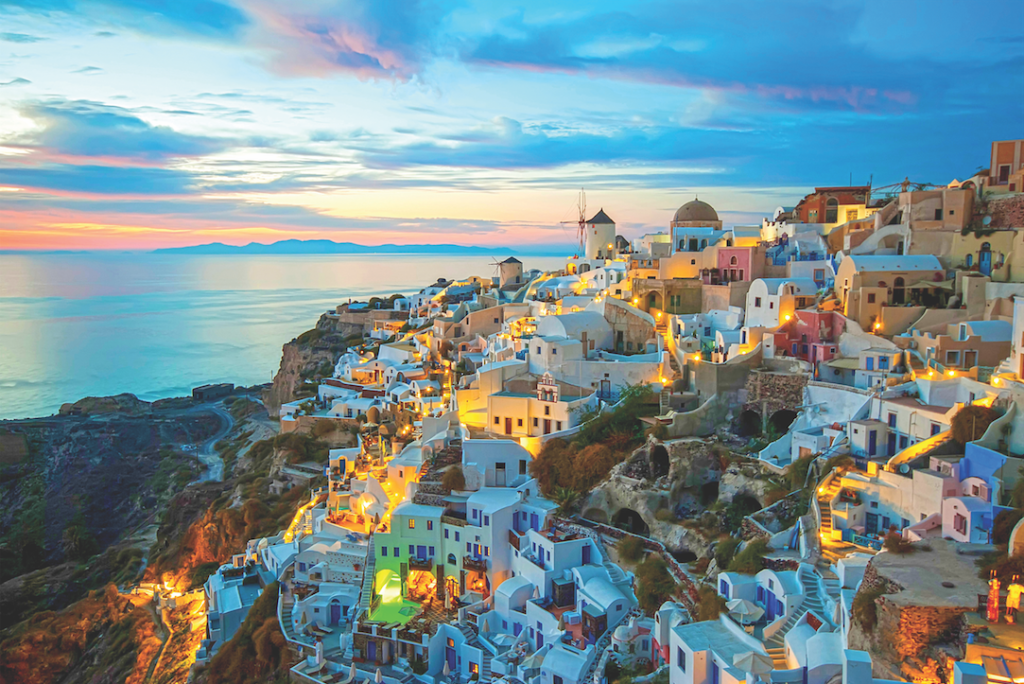
Santorini is a picturesque island in the Cyclades known for its stunning sunsets, white-washed buildings, and blue-domed churches. The island’s unique volcanic landscape adds to its charm, with the caldera offering spectacular views. Visitors can explore the charming villages of Oia and Fira, relax on the unique black and red sand beaches, and sample local wines.
3. Delphi

Delphi, once considered the center of the world in ancient Greek religion, is a must-visit archaeological site. Located on the slopes of Mount Parnassus, Delphi was home to the Oracle of Apollo. Visitors can explore the ruins of the Temple of Apollo, the ancient theater, and the stadium, while also enjoying panoramic views of the surrounding valley.
4. Meteora
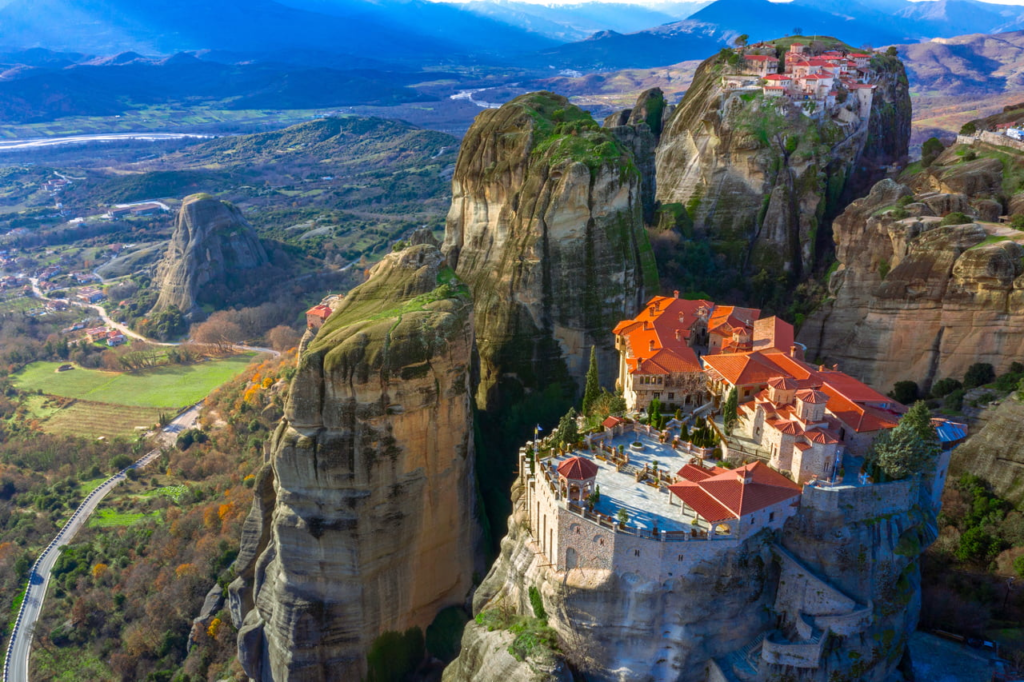
Meteora is a UNESCO World Heritage Site famous for its monasteries perched atop towering rock pillars. These monasteries, dating back to the 14th century, offer a glimpse into the spiritual life of the monks who built them. The unique landscape of Meteora is also a haven for hikers and photographers, providing breathtaking views and a sense of tranquility.
5. Mykonos
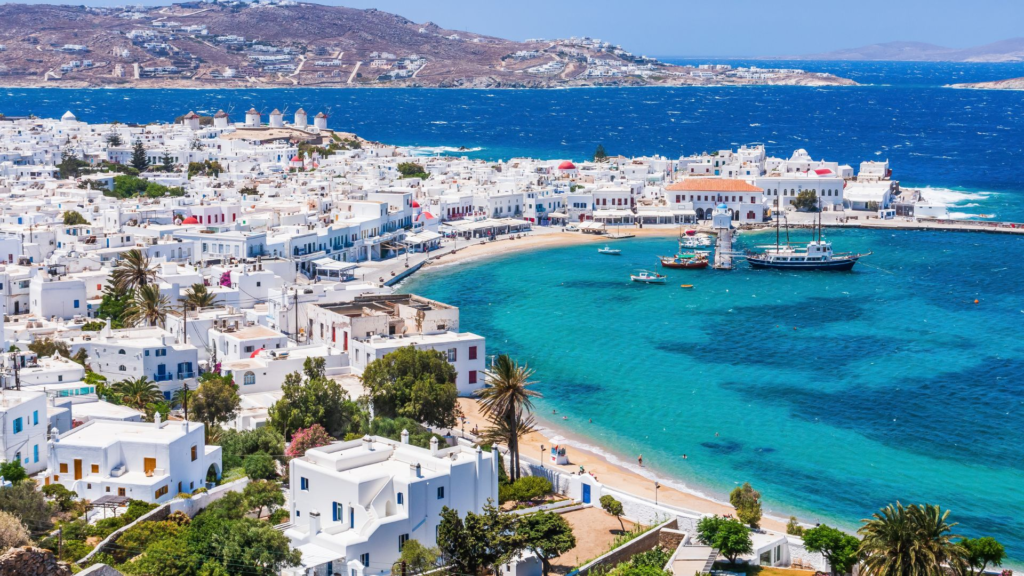
Mykonos is a vibrant island in the Cyclades known for its lively nightlife, beautiful beaches, and charming old town. The island’s capital, Chora, features narrow streets lined with white-washed buildings, shops, and restaurants. Mykonos also boasts stunning beaches such as Paradise Beach and Super Paradise Beach, which are popular with party-goers and sun-seekers alike.
6. Crete
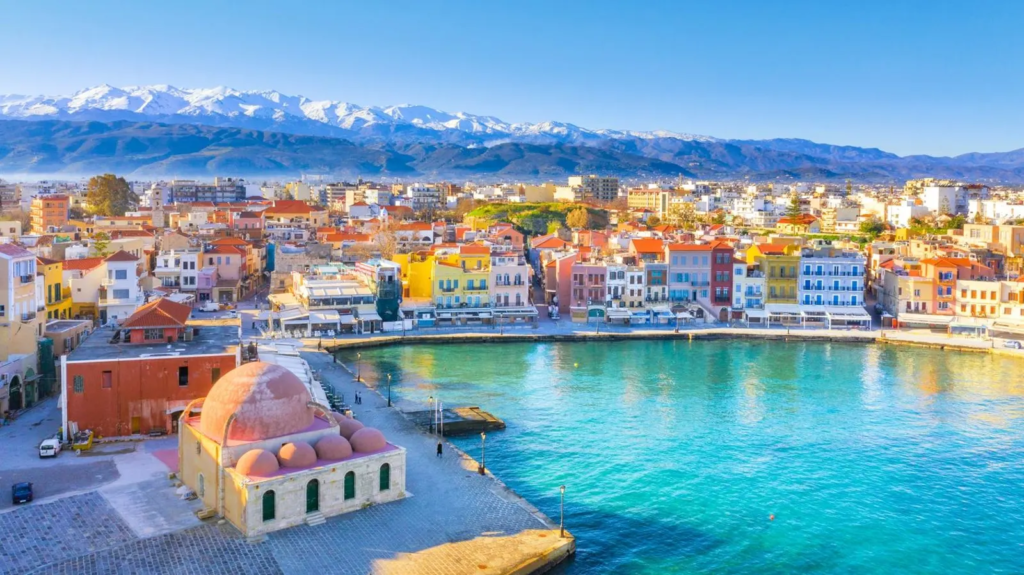
Crete, the largest island in Greece, offers a diverse range of attractions, from ancient ruins to stunning landscapes. Visitors can explore the Palace of Knossos, the center of the Minoan civilization, hike through the Samaria Gorge, and relax on the beautiful beaches of Elafonissi and Balos. The island’s vibrant cities, such as Heraklion and Chania, also offer rich cultural experiences and delicious cuisine.
7. Rhodes
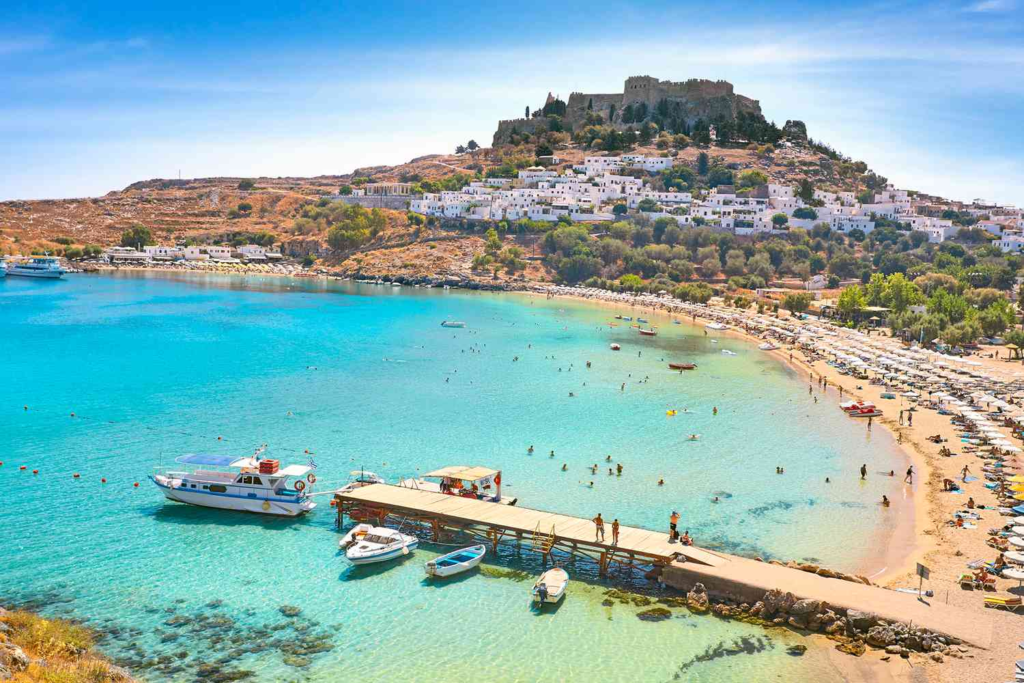
Rhodes, the largest of the Dodecanese islands, is renowned for its medieval Old Town, a UNESCO World Heritage Site. The island’s history is reflected in its well-preserved walls, towers, and gates, as well as the Palace of the Grand Master. Visitors can also enjoy the beautiful beaches, explore the ancient ruins of Kamiros, and visit the Valley of the Butterflies.
8. Nafplio

Nafplio is a charming coastal town in the Peloponnese, known for its Venetian architecture and historical significance. The town’s picturesque streets, filled with neoclassical mansions and cozy cafes, are perfect for a leisurely stroll. Visitors can explore the Palamidi Fortress, the Bourtzi Castle, and the Archaeological Museum of Nafplio.
9. Thessaloniki
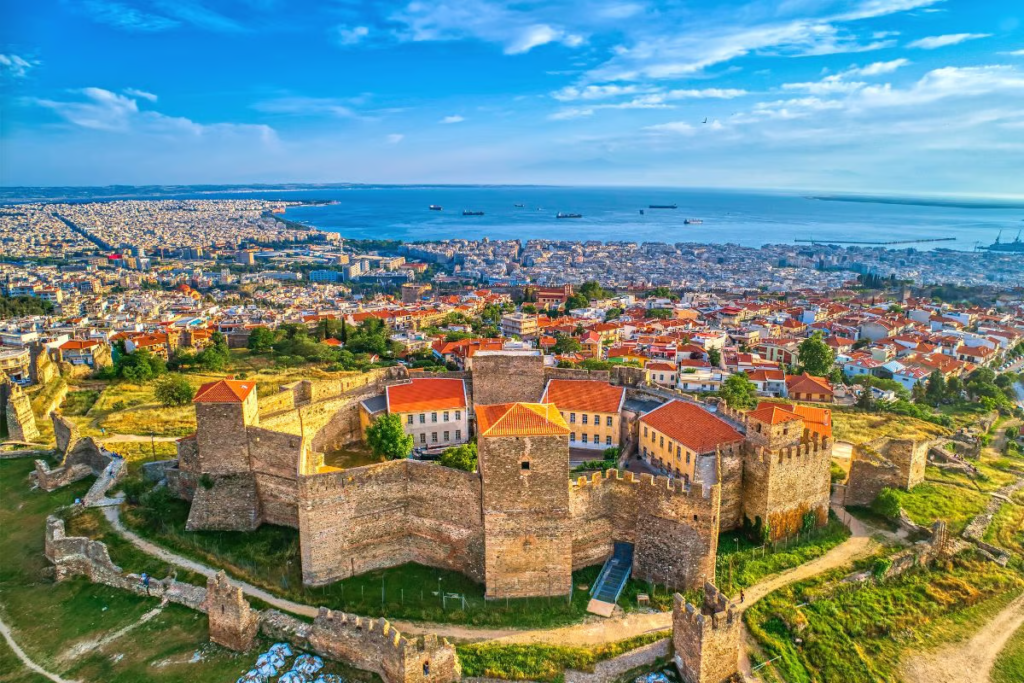
Thessaloniki, Greece’s second-largest city, is a vibrant cultural hub with a rich history. The city boasts numerous Byzantine churches, the Rotunda, and the White Tower, a symbol of Thessaloniki. The city’s lively waterfront promenade, bustling markets, and thriving nightlife make it a dynamic destination for travelers.
10. Olympia
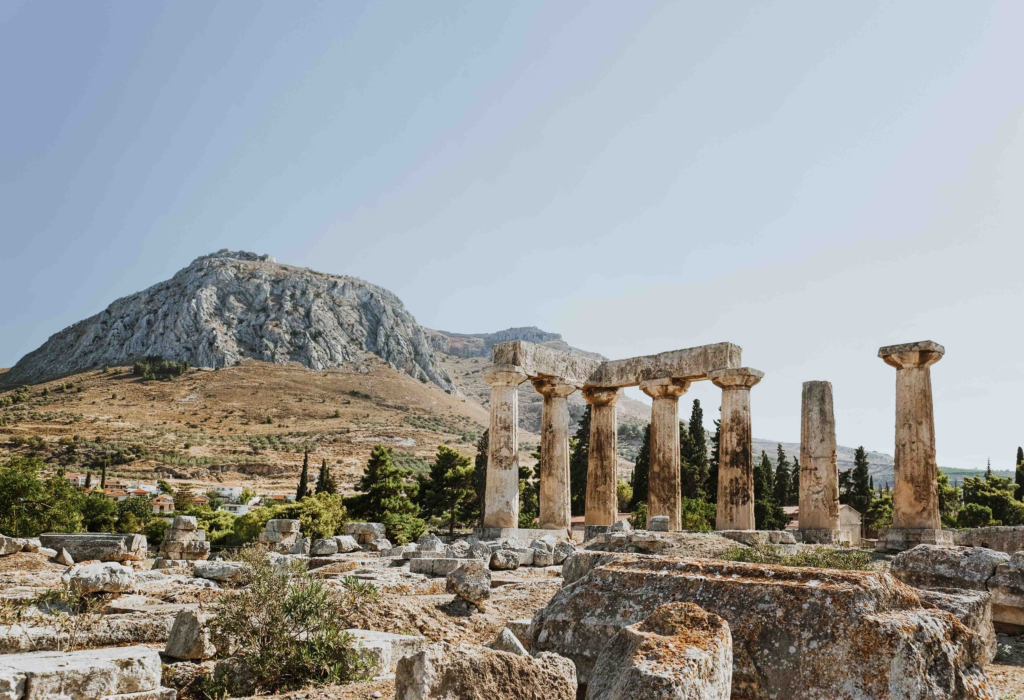
Olympia, the birthplace of the ancient Olympic Games, is a significant archaeological site located in the Peloponnese. Visitors can explore the ruins of the ancient stadium, the Temple of Zeus, and the Temple of Hera. The site also includes the Archaeological Museum of Olympia, which houses artifacts from the ancient games and the surrounding area.
Modern Cities and Islands
Athens, the capital of Greece, seamlessly blends ancient history with modern life. The city is a bustling metropolis with a rich cultural scene, vibrant nightlife, and excellent dining options. Beyond the Acropolis, Athens is home to numerous museums, including the National Archaeological Museum, which houses an extensive collection of ancient Greek artifacts.
Thessaloniki, Greece’s second-largest city, is known for its Byzantine architecture, lively festivals, and delicious cuisine. The city’s waterfront promenade is a popular spot for locals and tourists alike, offering stunning views of the Thermaic Gulf. Thessaloniki’s rich history is reflected in its many churches, such as the Hagios Demetrios and the Rotunda.
The Greek islands are famous for their breathtaking beauty and unique character. Santorini, with its iconic white-washed buildings and stunning sunsets, is a top destination for honeymooners and travelers seeking a romantic getaway. Mykonos, known for its vibrant nightlife and picturesque beaches, attracts visitors from around the world.
Crete, the largest of the Greek islands, offers a diverse range of experiences, from exploring ancient ruins to hiking in the rugged mountains. The island’s capital, Heraklion, is home to the Heraklion Archaeological Museum, which houses artifacts from the Minoan civilization. Chania, with its Venetian harbor and charming old town, is another must-visit destination on Crete.
Rhodes, located in the Dodecanese archipelago, boasts a rich history and well-preserved medieval architecture. The island’s Old Town, a UNESCO World Heritage Site, is a labyrinth of cobblestone streets, ancient walls, and historic buildings. The Palace of the Grand Master, a medieval castle, is one of the main attractions.
Natural Wonders
Greece’s natural beauty is as captivating as its historical and cultural heritage. The country’s diverse landscapes include mountains, forests, rivers, and a stunning coastline. The Meteora, a complex of monasteries perched on towering rock pillars in central Greece, is a UNESCO World Heritage Site and a marvel of natural and human-made beauty.
The Vikos Gorge, located in the Pindus Mountains, is one of the deepest gorges in the world and a haven for hikers and nature enthusiasts. The region is part of the Vikos–Aoös National Park, which is home to diverse flora and fauna, including rare species of birds and mammals.
The Peloponnese Peninsula, with its rugged mountains, fertile valleys, and beautiful beaches, is a paradise for outdoor enthusiasts. The region is dotted with charming villages, ancient ruins, and pristine nature reserves. The Mani Peninsula, in particular, is known for its wild beauty and traditional stone towers.
The Samaria Gorge, located on the island of Crete, is one of the longest gorges in Europe and a popular hiking destination. The trail winds through stunning landscapes, including dense forests, steep cliffs, and crystal-clear streams. The gorge is part of the Samaria National Park, which is home to unique plant and animal species.
Festivals and Celebrations
Greek festivals and celebrations are vibrant expressions of the country’s culture and traditions. The Carnival of Patras, held in the city of Patras in the weeks leading up to Lent, is one of the largest and most colorful carnivals in Europe. The festival features parades, masquerades, and various cultural events.
Easter is the most important religious holiday in Greece, marked by elaborate church services, feasts, and traditions. On Holy Saturday, the Resurrection service is held, and at midnight, candles are lit as the Holy Light is shared among the congregation. The festivities continue with a feast featuring lamb and other traditional dishes.
The Athens and Epidaurus Festival, held during the summer months, is a celebration of performing arts. The festival includes performances of ancient Greek drama, contemporary theater, music, and dance. The ancient theater of Epidaurus, known for its exceptional acoustics, is one of the main venues.
The Thessaloniki International Film Festival, held in November, is a major event in the world of cinema. The festival showcases a diverse selection of films from around the world and attracts filmmakers, critics, and movie enthusiasts.
Top Eight Most Famous Food of Greece








Contemporary Greece
Today, Greece is a modern European nation with a dynamic economy and a vibrant cultural scene. The country has faced economic challenges in recent years but has shown resilience and determination in overcoming them. Tourism remains a vital part of the Greek economy, with millions of visitors flocking to the country each year to experience its rich history, culture, and natural beauty.
Greece is also known for its contributions to art, literature, and science in contemporary times. Greek artists, writers, and scientists continue to make significant contributions to global culture and knowledge. The country’s universities and research institutions are at the forefront of various fields, including archaeology, marine biology, and renewable energy.
Greek hospitality, known as “philoxenia,” is legendary. Visitors to Greece are often struck by the warmth and friendliness of the people. Whether in a bustling city or a remote village, travelers can expect a warm welcome and a genuine interest in sharing the beauty and culture of Greece.
Conclusion
Greece, with its rich history, diverse landscapes, and vibrant culture, is a treasure trove of experiences waiting to be discovered. From ancient ruins to stunning islands, from traditional festivals to modern cities, Greece offers something for every traveler. The country’s legacy as the cradle
of Western civilization is evident in its many contributions to art, philosophy, science, and politics. Today, Greece continues to inspire and captivate, offering a unique blend of the ancient and the contemporary. Whether you’re exploring the streets of Athens, hiking through the mountains of Crete, or relaxing on the beaches of Mykonos, Greece promises an unforgettable journey through time and beauty.

